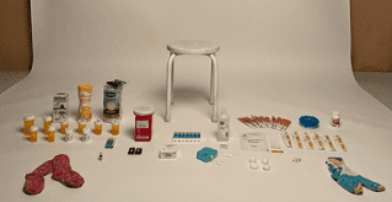No, I’m Not the Patient: Caring for an Aging Parent When You’re Disabled and Everyone Thinks You’re the One Dying
Caring for an aging (or ill) parent or loved one is always complicated. That subtle shift that takes place over time— where the parent becomes the one being cared for, instead of the other way around. It’s a journey as old as life itself. Under the best of circumstances, it’s a stressful time— for a change in the structure of any relationship always introduces new challenges… and learning experiences.
When you are disabled, yourself, and are beginning to care for an elderly parent or loved one, it can be especially complex— and, frankly, sometimes…weird. In this situation, it’s not unusual to find yourself saying things like this:
“I know you wiped my ass for a good portion of my life, but now let’s talk about why I really want that doctor over there to shove that colonoscopy probe into yours.”
Or, you might say:
“I acknowledge that I, personally, might take more medications than Michael Jackson did on a really bad day. But, that doesn’t mean that I won’t notice when you are accidentally taking three Lipitors in one afternoon.”
There’s no rule book for this kind of thing. No self-help book about caring for an aged loved when you, yourself, are disabled. At least, I’ve never seen one. And I looked. But, there plenty of books on organic parenting (what does that even mean?!?). Lots of stuff about the elderly. Plus, way too many copies of Fifty Shades of Grey.
My seventy-something father is currently having some prostate troubles. This is a common occurrence— most men will have issues in their prostate at some point in their lives. It’s simply a given. Like death, taxes, or dropping your cell phone into a toilet. Eventually, it happens to everyone.
Having a complex disability, like spinal muscular atrophy, has given me a depth of experience with doctors and the medical field. I’ve had a lifetime of fighting and advocating. So, I have been able to transfer these skills to other aspects of my life— like finding my dad the best urologist or fighting my cable company to give me free HBO.
If only society would recognize this ability and this potential, too. But, the instinctual perception is that we are the dependent ones, never the reverse. It’s deeply ingrained in society— you know, like racism, sexism and a love of ranch dressing.
Recently, I went with my dad to a specialist clinic. At the reception desk, I rolled up to the counter next to my dad. The counter was so high that I was probably only partially visible to the medical assistant looming above me. I felt like Oliver Twist asking for some bread crumbs.
“Hi,” I chirped from far below. I gestured to my dad next to me, “We’re here to check in for his appointment.”
The medical assistant’s eyes drifted down from her towering computer screen and zeroed in on me, “Oh, hello.” Her smile was overly helpful, “What’s your date of birth, hun?”
She hadn’t cast a glance at my dad— the actual patient. I paused and looked around. I spotted a chart about prostate health on a nearby wall, so I knew we hadn’t gotten off the elevator to the wrong floor.
There was only one conclusion. My wheelchairness had clearly stolen away her ability to process my first words. I felt a smirk struggling to break out over my mouth, “I know it’s hard to believe, but I’m actually NOT the patient.” I pivoted my wheelchair to face my father, “He is.”
“O—oh, ok,” she quickly gathered herself and turned back to the giant computer screen that eclipsed half the light in the room.
I nearly added, “Plus, last time I checked, I didn’t have a prostate.” But, I managed to refrain because I didn’t want to embarrass my father, who hated that he had to be at the office in the first place.
I’d like to say that was the only subtle incident that occurred that day, but it wasn’t. I constantly had to assert the supportive role that I held in my father’s life. To do battle with society’s preconceptions, all while trying to help out as much as I could. It was an added stressor that, really, I shouldn’t have had to worry about. I had enough on my plate.
So, if I had to write a book about this topic, to be sitting on the shelf next to all those books about organic parenting, I’d call it: ‘No, I’m Not The Patient’: Caring For An Aging Parent When You’re Disabled And Everyone Thinks You’re The One Dying.
Okay, so that might be a bit wordy. But, that didn’t get in the way of Fifty Shades of Grey.
So, maybe there’s hope for this one, yet.
About Rooted In Rights
Rooted in Rights exists to amplify the perspectives of the disability community. Blog posts and storyteller videos that we publish and content we re-share on social media do not necessarily reflect the opinions or values of Rooted in Rights nor indicate an endorsement of a program or service by Rooted in Rights. We respect and aim to reflect the diversity of opinions and experiences of the disability community. Rooted in Rights seeks to highlight discussions, not direct them. Learn more about Rooted In Rights



